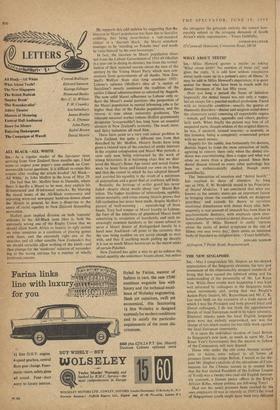SIR,—Miles Howard quotes a reader as asking 'What about teeth?
No mention of these yet,' and gives the reply, 'it is odd how seldom complaints about teeth come up in a. patient's story of illness.' It may be odd- in Miles Howard's experience: it is quite untrue for those who have been in touch with the dental literature of the last fifty years.
Over too long a period the focus of infection (especially the dental focus) was not only a vogue, but an escape for a puzzled medical profession. Faced with an incurable condition—usually the gastric or rheumatic disorders—doctor and surgeon sailed down the alimentary canal removing all expendable organs —tonsils, gall bladder, appendix and others, particu- larly teeth. When finally the patient was free of all suspected parts, though seldom of the original disease, he was, if uncured, termed neurotic—a neurotic, in this instance, being a completely eviscerated person with no more money.
Happily for the public, less fortunately for doctors, dentists began to resist the mass extraction of teeth, agreeing to remove them only when the dental evi- dence was overwhelming; thus a vogue and what was often no more than a placebo passed. Since then dental disease related to every other pathology has been as enthusiastically studied, though more scientifically.
The 'interaction of emotion and "dental health"' has received its share of attention. As long ago as 1936, F. W. Broderick stated in his Principles of Dental Medicine, 'I am convinced that what are known as the anxiety states are an important factor in bringing about the condition which we designate pyorrhoea' and extends his theory to co-relate emotional disturbances with dental decay also. Sub- sequently a vast amount of research has been done in psychosomatic dentistry, with emphasis upon emo- tional disturbance related to dental disease, and dental operations. If Miles Howard is really 'curious about the rarity of dental symptoms in the run of illness one sees every day,' there exists an immense body of literature to enlighten him.—Yours faithfully,
EDWARD SAMSON






































 Previous page
Previous page